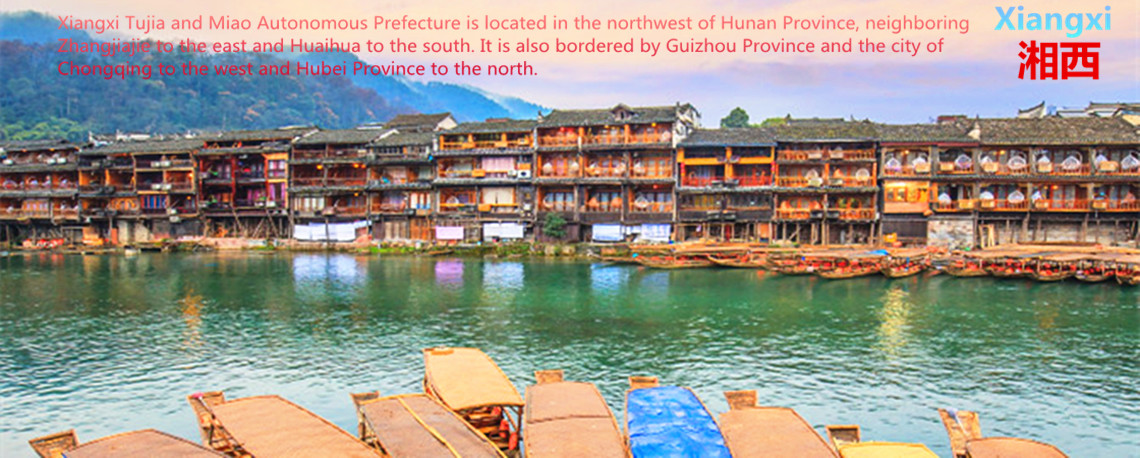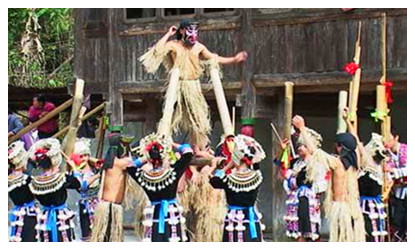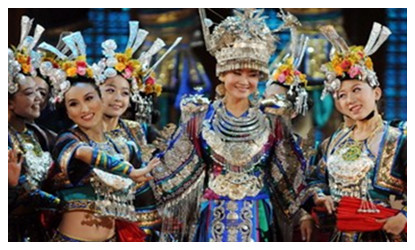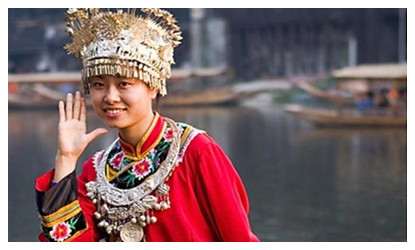
Songs of Miao Ethnic Minority
Wuling area in western Hunan Province is a home of Miao Ethnic Minority. It is the junction between east and west of China where is a piece of fertile land which breeds folk art of Miao Ethnic Minority.
Ancient Miao Minority Songs
Ancient Songs of the Miao Minority is the myth of poetic style that takes creation as its main contents. It is popular in the residence area of Miao, an ethnic group of China. The folk oral literary work is an epic created by the ancestors of the Miao people in their long time of production and work. The contents of Ancient Songs of the Miao Minority are very vast, from the emergence of the universe, the origination of human beings and all the species, and the big flood at the beginning when the universe was created and man first appeared on the earth to the great migration, the ancient social systems and the production and lives of the Miao minority. So it is the summarization of the ancient myths of the Miao ethnics. The whole poem includes four parts, all of which are the five-word structure and follows the rhyme of the Miao dialect. The poem employs a large number of figures of speech and molds more than one hundred people with names and family names. It vividly reflects the interpretation to heaven and earth and the origination of all the creatures and human beings by the ancient people of the Miao minority and the feat of creating history of man through hard efforts of those ancient people. So we can detect that the poem is full of romantic and idealist color.
The contents of Ancient Songs of the Miao Minority are very vast, from the emergence of the universe, the origination of human beings and all the species, and the big flood at the beginning when the universe was created and man first appeared on the earth to the great migration, the ancient social systems and the production and lives of the Miao minority. So it is the summarization of the ancient myths of the Miao ethnics. The whole poem includes four parts, all of which are the five-word structure and follows the rhyme of the Miao dialect. The poem employs a large number of figures of speech and molds more than one hundred people with names and family names. It vividly reflects the interpretation to heaven and earth and the origination of all the creatures and human beings by the ancient people of the Miao minority and the feat of creating history of man through hard efforts of those ancient people. So we can detect that the poem is full of romantic and idealist color.
 Because the ancient Miao minority had no written language, the whole epic has been orally handed down. The ancient songs are mostly sung in folk activities, wedding and funeral ceremonies, gathering of friends and relatives and folk festivals. Most of the actors are old people, wizard, singers, etc. It is usually carried out in the competition form and can be played successively for several days. The musical instruments for playing the background music are mainly Xiaotong, Mangtong and benches. It was not until the 1950s that the text written in the language of the Miao minority of the ancient songs was published. So far, the collected ancient songs of the Miao minority are approaching 300,000 characters.
Because the ancient Miao minority had no written language, the whole epic has been orally handed down. The ancient songs are mostly sung in folk activities, wedding and funeral ceremonies, gathering of friends and relatives and folk festivals. Most of the actors are old people, wizard, singers, etc. It is usually carried out in the competition form and can be played successively for several days. The musical instruments for playing the background music are mainly Xiaotong, Mangtong and benches. It was not until the 1950s that the text written in the language of the Miao minority of the ancient songs was published. So far, the collected ancient songs of the Miao minority are approaching 300,000 characters.
Ancient Songs of the Miao minority reflects the Miao people's philosophical ideas of animism, sacredness of life, equality of human beings, and the harmony and coexistence between man and nature. It is also the encyclopedia that combines the history, ethics, customs, clothes, architecture, climate, etc., of the Miao minority. As a result, it is embedded of very high research values. So far, the ancient myths are still sung among the people.
Ancient Miao Minority Songs
Ancient Songs of the Miao Minority is the myth of poetic style that takes creation as its main contents. It is popular in the residence area of Miao, an ethnic group of China. The folk oral literary work is an epic created by the ancestors of the Miao people in their long time of production and work.
 The contents of Ancient Songs of the Miao Minority are very vast, from the emergence of the universe, the origination of human beings and all the species, and the big flood at the beginning when the universe was created and man first appeared on the earth to the great migration, the ancient social systems and the production and lives of the Miao minority. So it is the summarization of the ancient myths of the Miao ethnics. The whole poem includes four parts, all of which are the five-word structure and follows the rhyme of the Miao dialect. The poem employs a large number of figures of speech and molds more than one hundred people with names and family names. It vividly reflects the interpretation to heaven and earth and the origination of all the creatures and human beings by the ancient people of the Miao minority and the feat of creating history of man through hard efforts of those ancient people. So we can detect that the poem is full of romantic and idealist color.
The contents of Ancient Songs of the Miao Minority are very vast, from the emergence of the universe, the origination of human beings and all the species, and the big flood at the beginning when the universe was created and man first appeared on the earth to the great migration, the ancient social systems and the production and lives of the Miao minority. So it is the summarization of the ancient myths of the Miao ethnics. The whole poem includes four parts, all of which are the five-word structure and follows the rhyme of the Miao dialect. The poem employs a large number of figures of speech and molds more than one hundred people with names and family names. It vividly reflects the interpretation to heaven and earth and the origination of all the creatures and human beings by the ancient people of the Miao minority and the feat of creating history of man through hard efforts of those ancient people. So we can detect that the poem is full of romantic and idealist color.  Because the ancient Miao minority had no written language, the whole epic has been orally handed down. The ancient songs are mostly sung in folk activities, wedding and funeral ceremonies, gathering of friends and relatives and folk festivals. Most of the actors are old people, wizard, singers, etc. It is usually carried out in the competition form and can be played successively for several days. The musical instruments for playing the background music are mainly Xiaotong, Mangtong and benches. It was not until the 1950s that the text written in the language of the Miao minority of the ancient songs was published. So far, the collected ancient songs of the Miao minority are approaching 300,000 characters.
Because the ancient Miao minority had no written language, the whole epic has been orally handed down. The ancient songs are mostly sung in folk activities, wedding and funeral ceremonies, gathering of friends and relatives and folk festivals. Most of the actors are old people, wizard, singers, etc. It is usually carried out in the competition form and can be played successively for several days. The musical instruments for playing the background music are mainly Xiaotong, Mangtong and benches. It was not until the 1950s that the text written in the language of the Miao minority of the ancient songs was published. So far, the collected ancient songs of the Miao minority are approaching 300,000 characters.Ancient Songs of the Miao minority reflects the Miao people's philosophical ideas of animism, sacredness of life, equality of human beings, and the harmony and coexistence between man and nature. It is also the encyclopedia that combines the history, ethics, customs, clothes, architecture, climate, etc., of the Miao minority. As a result, it is embedded of very high research values. So far, the ancient myths are still sung among the people.
The categorized Miao Ethnic Songs
According to their contents, the Miao’s folk songs can be categorized as follows: Youfangge (love song), Jiuge (toasting song), Kuge (bitter song), Ertongge (children’s song), Zangge (song for funeral), Laodongge, Miyuge, and Shizhengge (songs of labor, riddle and current politics), each with its own distinct melody. Feige (high in tone), popular in the northeast of Guizhou Province, is a special form of folk song performance.
According to their contents, the Miao’s folk songs can be categorized as follows: Youfangge (love song), Jiuge (toasting song), Kuge (bitter song), Ertongge (children’s song), Zangge (song for funeral), Laodongge, Miyuge, and Shizhengge (songs of labor, riddle and current politics), each with its own distinct melody. Feige (high in tone), popular in the northeast of Guizhou Province, is a special form of folk song performance.
 Pange is a form where young men and women compete in an old antiphonal singing style to express their wishes and to demonstrate their talents. Generally, men start the Pange. If the man loses in the song, the woman will drive him away by splashing water, which, in Miao’s tradition, is of no malevolence but a good-willed baptism. Provided the woman answers the song fluently and both of them have feeling for each other, they may get engaged. But if the woman loses, they could still continue singing until their being engaged.
Pange is a form where young men and women compete in an old antiphonal singing style to express their wishes and to demonstrate their talents. Generally, men start the Pange. If the man loses in the song, the woman will drive him away by splashing water, which, in Miao’s tradition, is of no malevolence but a good-willed baptism. Provided the woman answers the song fluently and both of them have feeling for each other, they may get engaged. But if the woman loses, they could still continue singing until their being engaged.On that day, woman’s parents prepare the wine in time for the prospective groom’s family to toast all the participants of the song. At last, girl’s parents, taking a pair of ox’s or ram’s horns as cups, toast the couple to be married soon. Later, the entire night participants play the Lusheng (a kind of instrument) and dance to congratulate the new couple.






 Ask Questions ?
Ask Questions ?